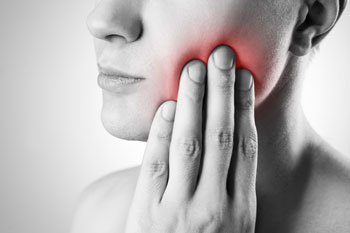Why Do Cracked Teeth Hurt?
 To understand why cracked teeth hurt, it helps to know the anatomy of the tooth. Inside the tooth, under the white enamel and a hard layer called dentin, is the inner soft tissue called pulp. The pulp contains the tooth’s nerves and blood vessels.
To understand why cracked teeth hurt, it helps to know the anatomy of the tooth. Inside the tooth, under the white enamel and a hard layer called dentin, is the inner soft tissue called pulp. The pulp contains the tooth’s nerves and blood vessels.
When the outer hard tissues of the tooth are cracked, chewing can cause flexing of the tooth, and the pulp can become irritated. Eventually, the pulp will become damaged to the point that it can no longer heal itself. The tooth will not only hurt when chewing but may also become sensitive to temperature extremes. Extensive cracks can lead to infection of the pulp tissue, which can spread to the bone and gum surrounding the tooth.
Cracked teeth show a variety of symptoms, including pain when chewing, possibly with release of biting pressure, or pain when your tooth is exposed to hot or cold. In many cases, the pain may come and go.
Repairing Broken Teeth
It is wise to act early at the first sign or symptom of a potential crack in the tooth. If a filling is already present, this filling will need to be removed to investigate the crack underneath the filling. In most cases, a crown is necessary to stabilize the crack in the tooth. If however, the nerve is involved then root canal treatment will be required as well. No matter what your age, we can help select the best option for repairing your teeth and restore your smile.
Chipped Teeth – FAQ’s
What should I do if I chip my tooth?
Chipped teeth account for the majority of dental injuries. Most chipped teeth can be repaired either by reattaching the broken piece of tooth enamel or by bonding a tooth-colored filling or crown in place. See the dentists at Albany Place Dental Practice as soon as possible after the injury to treat your chipped tooth and keep it from worsening.
After treatment for a cracked tooth, will my tooth completely heal?
Unlike a broken bone, the fracture in a cracked tooth will not heal. In spite of treatment, some cracks may continue to progress and separate, resulting in loss of the tooth. Placement of a crown on a cracked tooth provides maximum protection but does not guarantee success in all cases.
The treatment you receive for your cracked tooth is important because it will relieve pain and reduce the likelihood that the crack will worsen. Once treated, most cracked teeth continue to function and provide years of comfortable chewing.
How can I prevent future cracks?
While cracked teeth are not completely preventable, you can take some steps to make your teeth less susceptible to cracks:
- Skip chewing on hard objects such as ice, unpopped popcorn kernels or pens.
- Don’t grind or clench your teeth.
- If you clench or grind your teeth while you sleep, talk to us about getting a mouthguard to protect your teeth.
- Wear a mouthguard or protective mask when playing contact sports.
Learn More About Your Options
To correct a fractured or chipped tooth, contact our practice to learn more about the best and most advanced options for your needs. We look forward to helping you smile confidently again!

Dec 19, 2018 at 7:58 AM
I took advil or tynenol with cold water. My orthodontist suggested try rinsng your mouth with salt water. It will get better as your teeth align.
Dec 29, 2018 at 6:40 AM
Yep, there are home remedies for an abscessed tooth and they work about as good as the home remedy for an infected appendix. It's called temporary pain control.